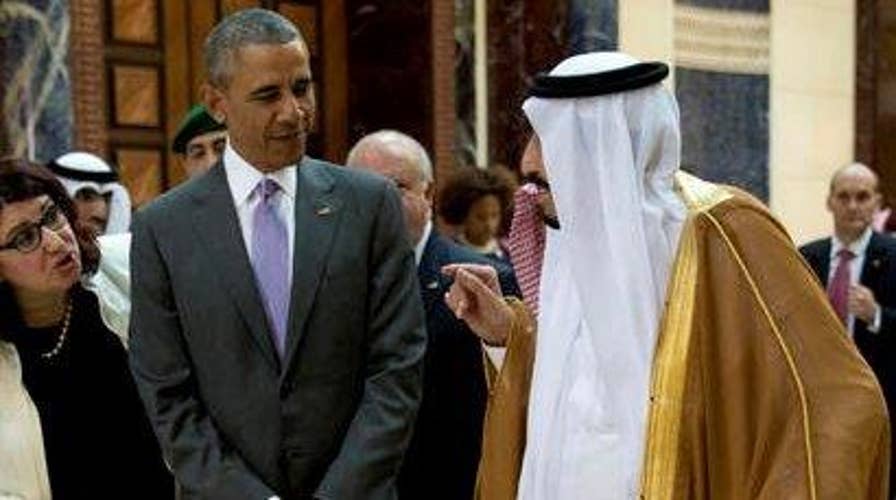President Obama faces contentious meetings with European and Gulf state leaders during his trip this week to Europe and Saudi Arabia. Why? Because of his continuing refusal to adopt a serious strategy to defeat ISIS, confront Iran’s increasingly belligerent behavior, and his inexplicable comments published in an April 2016 Atlantic article that blamed Europe and Gulf states for his administration’s growing list of foreign policy failures.
The Atlantic article will lead to some awkward questions for Mr. Obama from the leaders of America’s closest allies.
For example, the president will undoubtably be asked by European and Gulf state leaders to explain how, after his administration ignored the growing crisis in Libya for the past four years and his 2011 “leading from behind” strategy during the Libyan civil war, he can criticize European and Gulf states of being “free riders” and not having “skin in the game” in the Libyan situation.
I imagine British Prime Minister Cameron will say to the president, “But Mr. Obama, France and the United Kingdom took the lead in fighting that war because you refused to.”
Saudi leaders are more concerned about Obama’s comment in the Atlantic article that Saudi Arabia needs to find a way to “share the neighborhood” with Iran and “institute some sort of cold peace.” These incoherent remarks must have enraged Saudi officials in light of the July 2015 nuclear deal with Iran which they strongly oppose and a recent surge in Iranian missile tests.
Obama’s tin-eared comments about Saudi Arabia may be why Saudi King Salman was not there to greet him when the president’s plane landed in Riyadh Wednesday. The King did greet other heads of state when they arrived, according to Reuters.
Given the way he has ignored Saudi security concerns and tilted toward Iran during his presidency, I assume the Saudis have written off Mr. Obama and recognize that most experts in Washington – Republican and Democrat – do not share his radical and disjointed foreign policy views. The Saudis know their strong relationship with the United States will survive Barack Obama’s presidency. But even if they do understand this, Saudi leaders also know that this president’s failed Middle East policies did enormous damage to Middle East security that they will have to live with for many years to come.
Aside from Obama’s Iran policy – which is making Iran a regional hegemon – Riyadh is worried about the Syria/Iraq situation and the absence of a serious U.S. strategy to defeat ISIS and restore stability to the region.
Although Mr. Obama recently said the U.S. has “momentum” in its effort to defeat ISIS, the truth is that although ISIS has lost some ground in Iraq and Syria, it has expanded its reach in North Africa, Afghanistan and Europe.
The president also has been criticized for his refusal to provide more financial and military support to the Iraq Kurds.
When Gulf state leaders press President Obama for a bigger U.S. commitment to defeat ISIS in Iraq and Syria, he is likely to ignore their request and claim his strategy is working.
European and Gulf state leaders are certain to be frustrated with President Obama’s visit. In his mind, this trip is a victory lap. Mr. Obama does not plan to do anything meaningful for the rest of his presidency to defeat ISIS or promote stability in Syria and Iraq. He intends to defend the Iran nuclear deal as a legacy achievement of his presidency regardless of how badly the Iranians behave.
President Obama’s trip will not further damage America’s relations with European and Gulf states because they know he is a lame duck and expect the next president will be a stronger leader who will adopt a tougher and more sensible foreign policy, especially if a Republican wins the White House this fall.
The problem with this trip is that it will telegraph American weakness and divisions between the U.S. and its allies to our enemies who may try to exploit this weakness before the end of the Obama presidency. Any perception of American weakness endangers global security.
Mr. President, you should have stayed home.









































